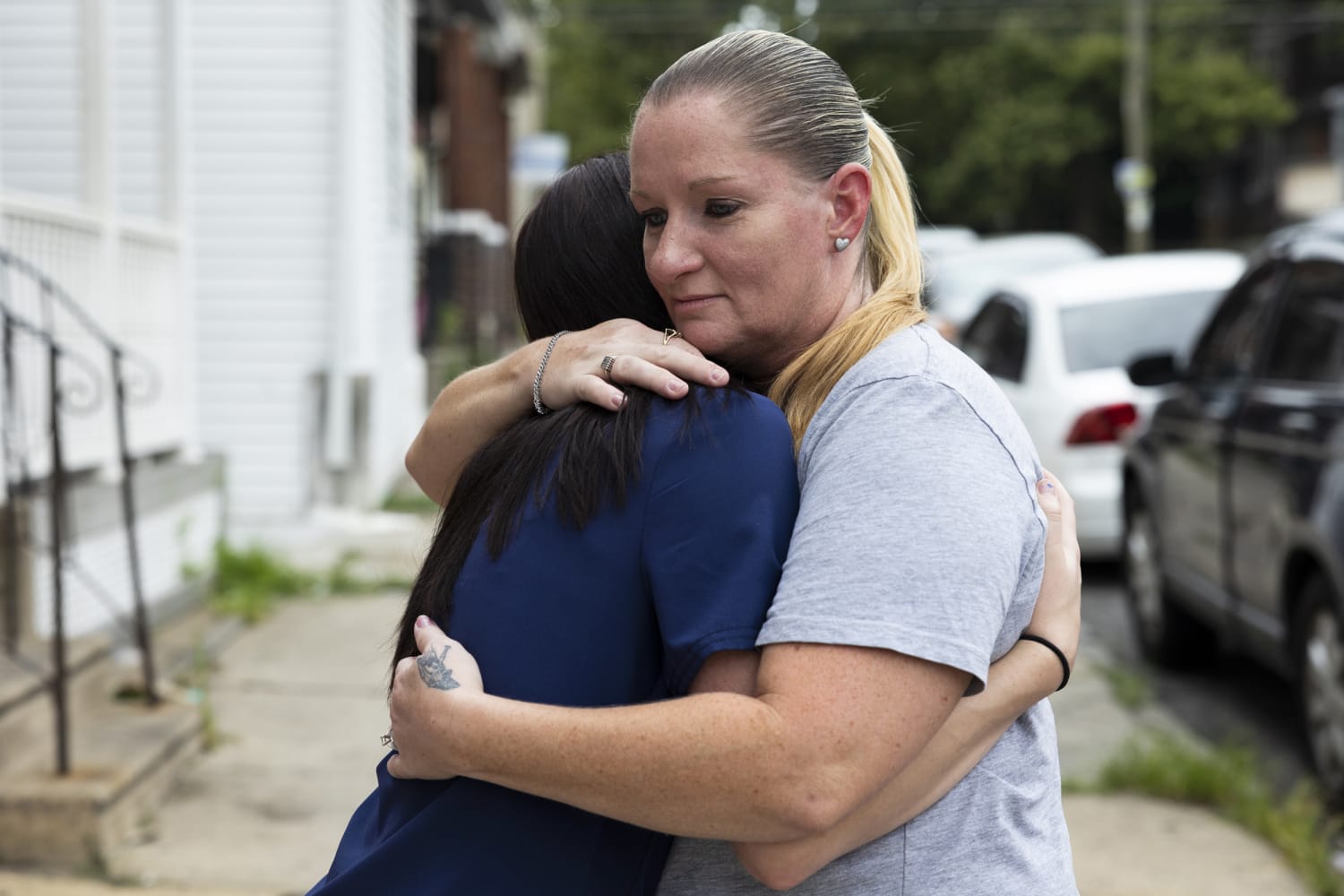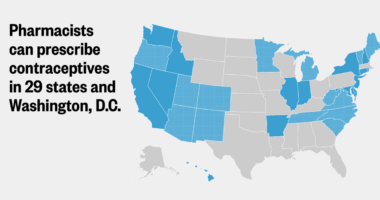Grievances against the judge for her courtroom behavior were piling up around the time Kress saw her in late 2017, and not just from disgruntled parents but lawyers, social workers and foster families, too. Her actions included failing to ensure litigants had the right to be heard, a pattern of ordering parents handcuffed or threatening incarceration without due process and lashing out with words so demeaning she once made an attorney cry.
The case against Younge reveals a rare glimpse inside the operations of a family court, which are not often made public, and highlights how judges who demonstrate malfeasance and fail to be impartial can harm people at their most emotionally fraught. Family advocacy groups have called for more training of family court judges and officials in recent years, saying some are simply assigned to such cases and don’t understand the delicate dynamics involved.
For Younge’s conduct, the Pennsylvania Court of Judicial Discipline last month suspended her for six months without pay. The court’s top judge wrote a scathing opinion, noting that her punishment falls just short of the most severe penalty for a judge — removal from office — because that generally involves criminal conviction.
“The Court views this case as the most egregious one involving rude demeanor, failure to timely proceed and imperious action it has seen,” President Judge Jazelle Jones wrote.
Two judges disagreed with the suspension as a slap on the wrist, with one writing that Younge should have been permanently removed after “she caused one disaster after another.”
Younge, who was also ordered to write letters of apology to every person she wronged, will still be allowed back on the bench in January. Prior to the disciplinary investigation, Younge was removed from family court and placed in Philadelphia County’s civil division overseeing arbitration appeals, where she’ll return.
One of Kress’ daughters, now an adult, plans to file a lawsuit against the city for her time in foster care after Younge had her removed from her home as a minor. Younge, who acted in an official capacity as a judge, is immune from being sued.
“She was a bully. She was very intimidating and very nasty,” Kress said. “Never in a million years did I think our justice system was like this. Never did I think that judges were doing this and getting away with it.”
Trail of complaints
Before becoming a judge, Younge spent a decade as a deputy city solicitor for the Philadelphia Department of Human Services’ child welfare unit. She ran as a Democrat in November 2015 for one of 15 open judgeship positions within the city’s Municipal Court and Court of Common Pleas, winning a seat despite not earning a recommendation from the Philadelphia Bar Association.
After her victory, she was quickly treading water in family court. She failed to make the 30-day filing deadline for her opinions in multiple cases and requested numerous extensions from the Superior Court. The backlog only worsened with the resignation of her first law clerk in July 2016. In one case, about 260 days had elapsed before she filed an opinion, according to the Court of Judicial Discipline.
Finally, after nearly two years of Younge drowning in cases, the top judge overseeing the Philadelphia Court of Common Pleas petitioned to transfer her out of family court in June 2018.
Around the same time, Younge’s conduct in family court was gaining public attention: A 2018 investigation in the law journal the Legal Intelligencer highlighted accusations of her violating parental rights, and people came forward to file complaints, prompting requests for a formal review by the Judicial Conduct Board. The Court of Judicial Discipline found in its opinion:
- Younge had a repeated demeanor that was “disrespectful, condescending and undignified.”
- She said of a social worker whose actions she disagreed with, “I would not believe his tongue if it were notarized.”
- She wrongly claimed a mother who fell ill during a parental rights hearing walked out of the courtroom without permission, then refused to allow the mother to return to testify and ordered her parental rights involuntarily terminated.
- She was “angry, discourteous and impatient” toward an attorney who had arrived one minute before a hearing was scheduled to start and “caused her to cry in open court.”
- She was “rude, arrogant and dismissive” to an attorney who had been summoned by another judge in a nearby courtroom, and when he returned to Younge’s courtroom and attempted to apologize, she “refused to speak with him” and ordered a contempt hearing during which she fined him $750. (That ruling was later overturned on appeal after the Superior Court found she had abused her discretion.)
- Over an attorney’s objection that three children remain in their mother’s home but with supervision from the Department of Human Services, Younge had the mother handcuffed in her courtroom and detained while the children could be removed. No contempt hearing was held prior to Younge ordering the mother to be held “in a cell ‘till I get these babies,” the judge said, according to a transcript. In the mother’s case, there were no allegations of abuse, neglect or safety risk.
- She ordered a father to be jailed for seven days after she believed he had unauthorized contact with his children, which he denied. A Superior Court review later vacated the contempt decision, finding the father was not given his due process rights and wrongly incarcerated.
Jimmy Binns, a Philadelphia attorney who has tried to gain custody of his three grandchildren after they were placed in foster care, said he witnessed Younge’s demeanor in court and reported her behavior.
“She should never again wear a judicial robe,” he said.
During her sanction hearing in April, Younge was apologetic and said she should have taken time off because of personal challenges, including a medical diagnosis and separation from her husband. She wiped away tears as she described how her faith would help her prove worthy of her judicial position and said she was in therapy.
“It is also my faith that requires me to be accountable when I have done wrong and when I have hurt others,” Younge said. “And in this matter there are no exceptions. I was wrong.”
Character witnesses described Younge’s passion for children and believed she had “learned her lesson” and that she, herself, was a “good mother.”
Younge could not be reached for further comment through her attorney, Charles Gibbs.
In a statement in June, following her suspension, Gibbs said Younge has “dedicated her life to public service and helping others, and the Court’s decision will enable her to continue to pursue her passion in the justice system.”
Sanctions rare
The sanction against Younge is notable because formal charges against judges in Pennsylvania, like most other states, are rarely filed.
The state’s Judicial Conduct Board — which receives hundreds of misconduct complaints every year and is made up of three judges, three attorneys and six citizen members — dismisses the majority of complaints, typically finding there was no probable cause in the allegations.
The proceedings inside of a family court can be particularly opaque because the matters are often sensitive and involve children and accusations of domestic abuse. But that also means judges who may be misbehaving or abusing their power can do so with little public scrutiny, legal experts say.
“More than anywhere else, emotions are frayed in family court, and judges are given really extraordinary discretion in deciding life-changing things like who gets custody of a child,” said Charles Gardner Geyh, an Indiana University law professor who studies judicial conduct.
“A lot of times, complaints arise simply because someone lost their case and is pissy about it. And then you have extreme situations like this,” Geyh added, referring to Younge, “where a judge’s fitness to serve is called into question.”
Joseph Metz, counsel for the Pennsylvania Court of Judicial Discipline, said a judge’s entire career history is taken into consideration when a sanction is handed down.
“The weight it is given is dependent on the nature of the offense and the circumstances,” Metz wrote in an email. “Each sanction is tailor made and specific to the case but prior history is always of importance.”
In Younge’s case, she was not previously the subject of such an investigation.
Kress shook her head recently when she thought about how Younge is being afforded a second chance.
“How dare you separate other families because your family is going through something,” Kress said. “It makes more sense now why she was doing what she was doing, but it doesn’t make it right.”
Lives upended
Kress’ case stemmed from an anonymous complaint of abuse and neglect against her and her boyfriend in 2017 that prompted a visit from a caseworker. That caseworker, who has since left the Department of Human Services, interviewed the family, Kress said, and determined there was no abuse, but her daughters had “inadequate supervision and improper care,” according to the paperwork filed.
Kress said the caseworker clashed with her parenting style and claimed she was “militant.” While she was strict in raising her daughters, giving them a routine of homework and chores and withholding their electronics if they disobeyed, Kress denied it warranted their removal.
Her three youngest daughters were separated and placed into various foster and group homes as Kress attempted to get them back through the courts.
Wanting to draw attention publicly, she organized protests with other families affected by Younge outside of the Department of Human Services, holding up signs that read, “Younge and reckless.”
In 2018, Kress’ case was moved to another judge who lifted a stay-away order that Younge had been imposed. While Kress eventually got her daughters back after being required to attend parenting classes, the trauma still affects them all: Two of her daughters said they suffered abuse and neglect in the various homes that the Department of Human Services had placed them in, and one of her daughters attempted suicide.
“My children never knew what abuse or neglect was until what was done to them,” Kress said.
Kress’ daughter Brianna Donahue, now 19, plans to file a lawsuit against the city next week for negligence and violation of her civil rights over how she said she was treated while in foster care. The Department of Human Services did not immediately respond to a request for comment.
While Kress has her daughters back, other families remain fractured.
Jeffrey and Virginia McKale, of New Jersey, came before Younge in 2017 in a bid to get their two grandsons from their mother, who had been using drugs. But the McKales said Younge belittled them, leading them to get up during the hearing, which further enraged the judge. Any chance of obtaining custody was lost that day, Jeffrey McKale added.
“It was a circus,” he said. “She made our lives miserable.”
Their youngest grandson, 7, has developmental disabilities and remains in a care facility while their other grandson, 12, toggled between seven foster homes in four years. Before the McKales’ daughter died in November 2018, she wrote in a notarized letter that she wanted her father, Jeffrey, and stepmother, Virginia, to take her children. Almost three years later, they are still trying to gain custody of the 7-year-old, while their other grandson was placed with another family member — a process that has taken a financial toll with lawyers and other costs.
“If we knew how much power that judge had, we wouldn’t have emptied our bank accounts to get nowhere,” Jeffrey McKale said.
Renee Beeker, the founder and president of the National Family Court Watch Project, a nonprofit organization that has observed family court proceedings in several states, said the fallout from a judge’s poor actions can drive families into further financial hardship and cause extended trauma. She advocates for more oversight of judges in family court and said often judges who win an election are simply placed into family court assignments without any experience or training.
That Younge spent a decade in Philadelphia’s child welfare unit prior to her judgeship is even more alarming, Beeker added. “This is just the tip of the iceberg,” she said.
Source: | This article originally belongs to Nbcnews.com











